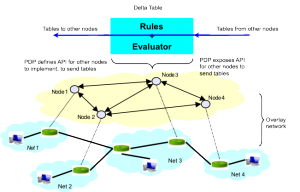Dynamic coalitions bring together multiple parties from different administrative domains, each with their own security profiles, which, despite their heterogeneity, have to rapidly and smoothly cooperate to maintain the communication, security and content control required by the overall objective of the coalition. Content management is a security concern of a dynamic coalition, as communication contents have to be appropriately managed and controlled to avoid misuse of information, data leakage, intentional or unintentional corrupting of information. Systems that can adapt to changes in coalition environments, and are capable of manage and control network-to-network configurations and security concerns in an integrated and coherent manner are vital. There is a need for technologies that allow such management and interoperability of dynamic networks in a secure manner.
Research questions
The questions that this project tackles are
1) Can network protocols, content management and security constructs be integrated into a unifying framework that provides a common ground for security/network management and control of dynamic hybrid networks?
ii) How can we analyse the impact of network dynamics on security concerns and vice versa?
Expected outcomes
The overall objective is the development of technologies and toolkits for joint network/security management and control of coalition networks. Specifically, the development of an integrated declarative approach for the specification of security and overlay network management, and evaluation and analysis toolkit for robustness assurance. The project has delivered
1) a declarative design and implementation of network management systems for dynamic networks by proposing a novel declarative networking language that is amenable to different types of analysis.
2) analysis techniques for checking that secure declarative networking protocols satisfy safety conditions, and identifying explanations of any detected violations. These include:
- a framework for auto-transformation of declarative network protocols to target action description model;
- efficient algorithm for query computation with respect to the target action model.
3) techniques and algorithms for diagnostic overlay network behavior under hybrid protocols.
The project is in collaboration with the IBM Thomas J. Watson Research Centre. Official website of the ITA Programme is available here.


